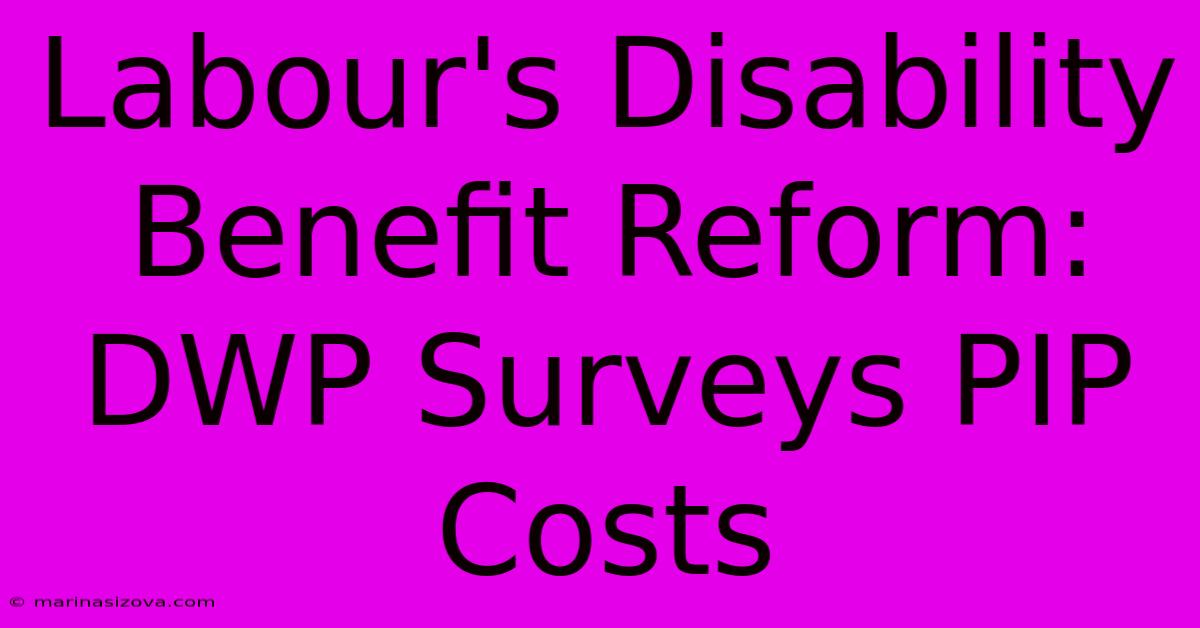Labour's Disability Benefit Reform: DWP Surveys PIP Costs

Discover more detailed and exciting information on our website. Click the link below to start your adventure: Visit Best Website. Don't miss out!
Table of Contents
Labour's Disability Benefit Reform: DWP Surveys PIP Costs
The Labour Party has proposed significant changes to the UK's disability benefit system, aiming to simplify and improve support for individuals with disabilities. A key element of this reform involves a thorough review of the Personal Independence Payment (PIP) system, a process that includes examining the costs associated with its implementation. The Department for Work and Pensions (DWP) has been tasked with conducting surveys to better understand these costs and their impact on the overall budget.
Understanding the PIP System
PIP is a benefit designed to help individuals with disabilities and long-term health conditions cover the extra costs associated with their condition. It is awarded based on an assessment of an individual's ability to carry out everyday tasks, such as dressing, washing, or walking.
However, the current system has faced criticism for its complex assessment process, lengthy waiting times, and the potential for inaccurate assessments. This has led to calls for reform, with Labour proposing a more streamlined and accessible system.
The DWP's Surveys: A Crucial Step in Reform
The DWP's surveys are an important step in understanding the financial implications of Labour's proposed reforms. By gathering data on the costs associated with administering PIP, the DWP can gain valuable insights into the potential financial impact of any changes.
These surveys are likely to cover a range of factors, including:
- The cost of assessments: How much does it cost to conduct a PIP assessment, including the fees paid to assessors and the administrative costs involved?
- The cost of processing claims: How much does it cost to process a claim for PIP, including the resources required for handling applications and appeals?
- The cost of ongoing support: What are the costs associated with providing ongoing support to individuals receiving PIP, such as regular reviews or support services?
The Importance of Transparency and Openness
The success of Labour's disability benefit reforms depends on the transparency and openness of the process. By publicly sharing the findings of the DWP's surveys, the government can demonstrate its commitment to a fair and equitable system. This will build trust with individuals with disabilities and their families, who are understandably concerned about the potential impact of any changes to the benefit system.
Moving Forward: A Collaborative Approach
The DWP's surveys represent a critical step in the ongoing debate surrounding disability benefit reform. By engaging in open and transparent dialogue, the government can ensure that any changes to the system are informed by evidence, meet the needs of those who rely on these benefits, and are implemented fairly and effectively.

Thank you for visiting our website wich cover about Labour's Disability Benefit Reform: DWP Surveys PIP Costs. We hope the information provided has been useful to you. Feel free to contact us if you have any questions or need further assistance. See you next time and dont miss to bookmark.
Featured Posts
-
Player Ratings Kangaroos Shine Newcomer Impresses
Oct 29, 2024
-
Autoneum Aktie Positive News Am Montag
Oct 29, 2024
-
Wontorra Pregunta A Kompany Bloqueada
Oct 29, 2024
-
O Futuro Do Textil Um Novo Comeco
Oct 29, 2024
-
Oscar Engelbert Investerar I Los Angeles
Oct 29, 2024
